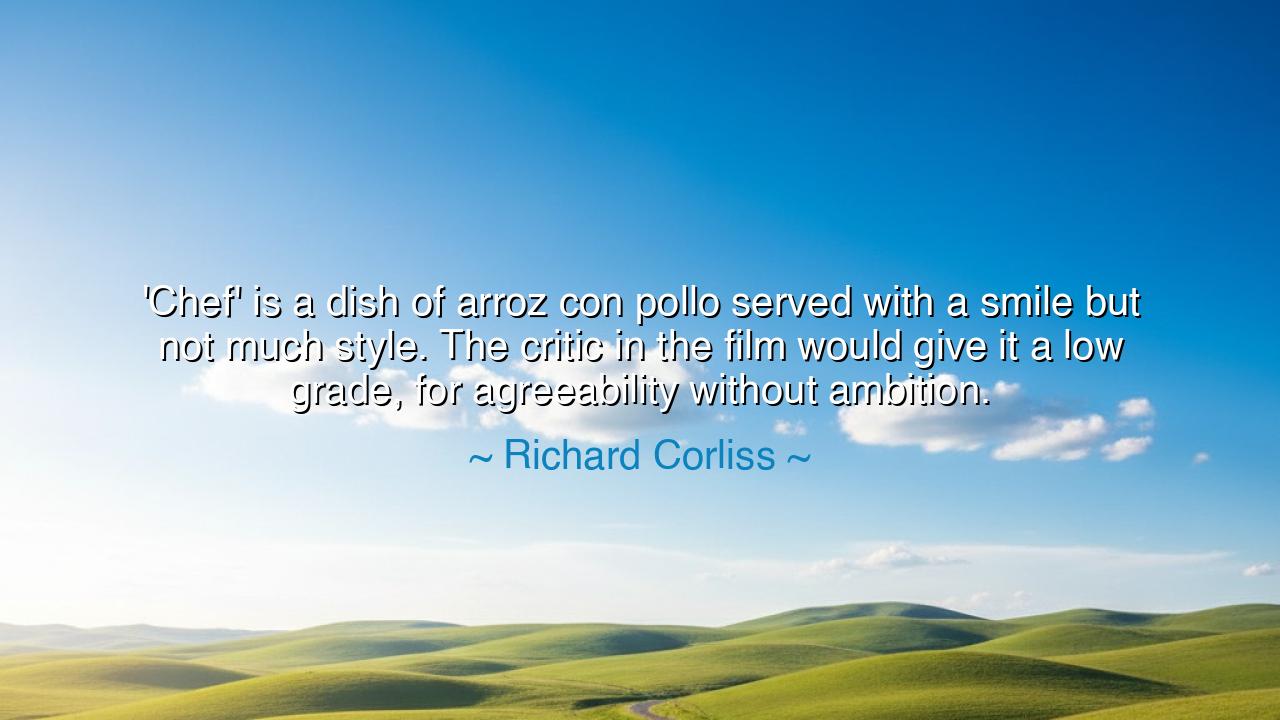
'Chef' is a dish of arroz con pollo served with a smile but not
'Chef' is a dish of arroz con pollo served with a smile but not much style. The critic in the film would give it a low grade, for agreeability without ambition.






Hear the words of Richard Corliss, critic and chronicler of cinema, who looked upon the film Chef and spoke with candor: “‘Chef’ is a dish of arroz con pollo served with a smile but not much style. The critic in the film would give it a low grade, for agreeability without ambition.” Though it seems but a review of a single work, within these words lies a timeless teaching, for they remind us of the tension between comfort and ambition, between the pleasant meal that fills the stomach and the daring dish that stirs the soul.
The meaning of this truth begins with the smile. To serve with a smile is no small virtue—it is the offering of warmth, kindness, and agreeability. Yet Corliss warns that a smile without style, without daring, remains incomplete. To create art, whether in film, in cuisine, or in life, requires more than charm; it demands courage, the willingness to risk, to innovate, to strike boldly at the heart of imagination. Without such ambition, one may win temporary approval, but not lasting greatness.
History provides us with many such examples. Consider the reign of Emperor Hadrian. He might have been content merely to rule in peace and maintain the empire’s stability. Yet Hadrian was driven by vision—he built walls, temples, and monuments that endure across centuries. Hadrian could have been agreeable and cautious, but it was his ambition that carved his memory into stone. So too in art: the creator who only pleases may be remembered for a season, but the one who dares to create with fire is remembered forever.
Corliss also reveals the danger of complacency. The dish of arroz con pollo he invokes is wholesome, nourishing, agreeable—but it does not inspire awe. In this metaphor, he warns against living a life that is only safe, only pleasant, without the seasoning of vision or the fire of invention. To choose safety always, to seek approval without risk, is to serve life with “not much style.” One may earn politeness, but not reverence; one may find acceptance, but not immortality.
Yet there is compassion in his words as well. For not every moment demands grandeur, and not every act requires revolution. There is a place for comfort, for agreeability, for the meal that soothes rather than dazzles. But Corliss reminds us that if we wish to rise above the ordinary, if we long for our work to live beyond the present hour, we must be willing to embrace ambition, even when it invites criticism. For critics may scorn, but history remembers the daring.
The lesson for us is clear: do not be content with merely pleasing others. Do not serve life with only a smile if your soul holds within it the fire of style. Be bold in your art, in your work, in your choices. Offer not only nourishment, but wonder. Dare to create what others may call excessive, strange, or ambitious, for it is in ambition that greatness is born. The agreeable path may win you comfort, but the ambitious path may win you legacy.
Therefore, let each one act thus: smile in kindness, but let your smile be the prelude to daring deeds. Work not only to soothe but to inspire. Whether in art, labor, or daily living, do not settle for the safe dish when you are capable of creating a feast that awakens the senses and stirs the heart.
Thus, the teaching is eternal: Agreeability without ambition is a fleeting sweetness, like arroz con pollo without spice. To live fully is to season your life with daring, to serve it with both smile and style, so that what you offer is not only accepted, but remembered.






AAdministratorAdministrator
Welcome, honored guests. Please leave a comment, we will respond soon